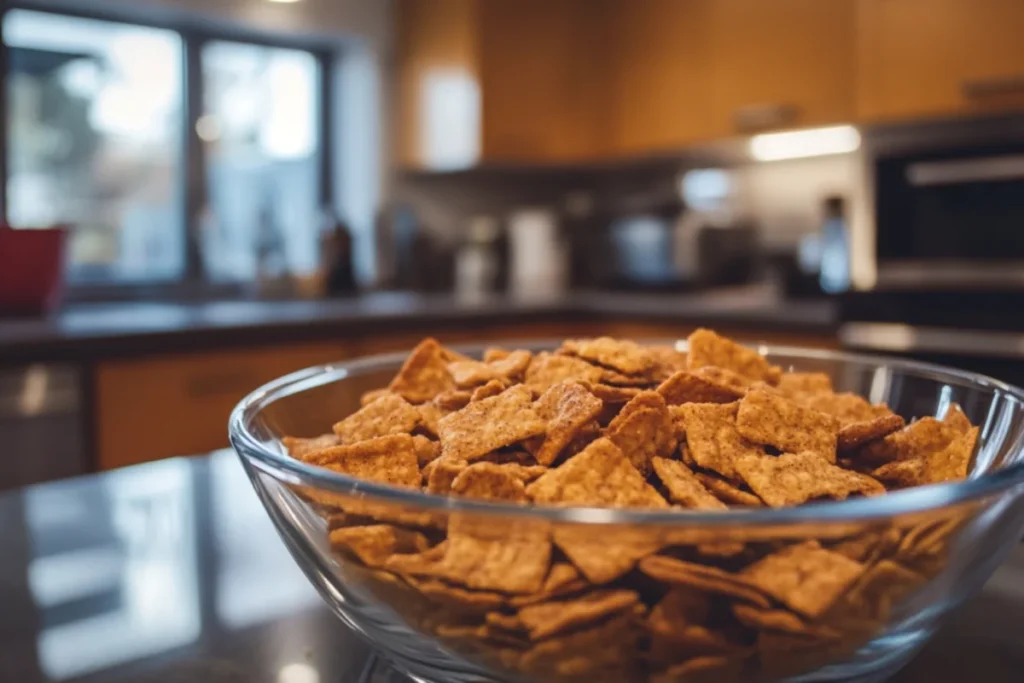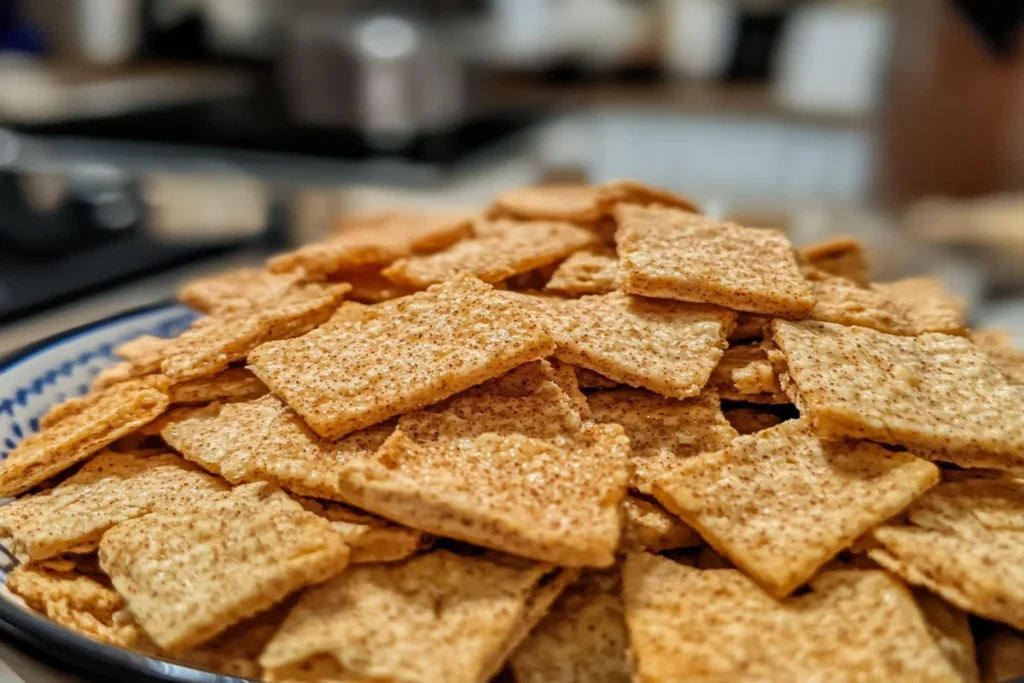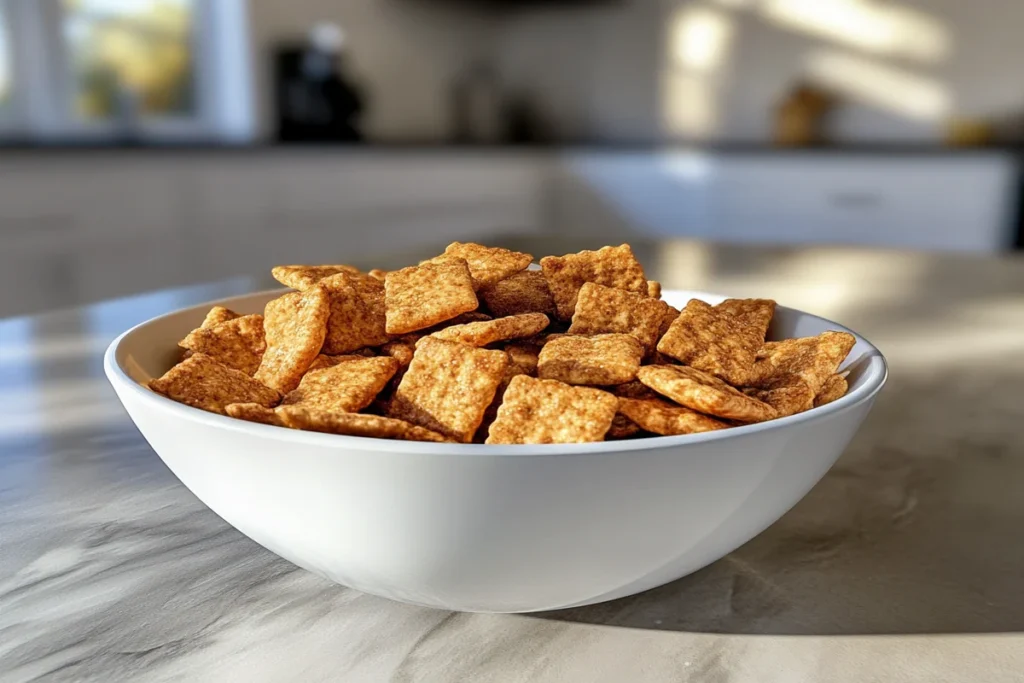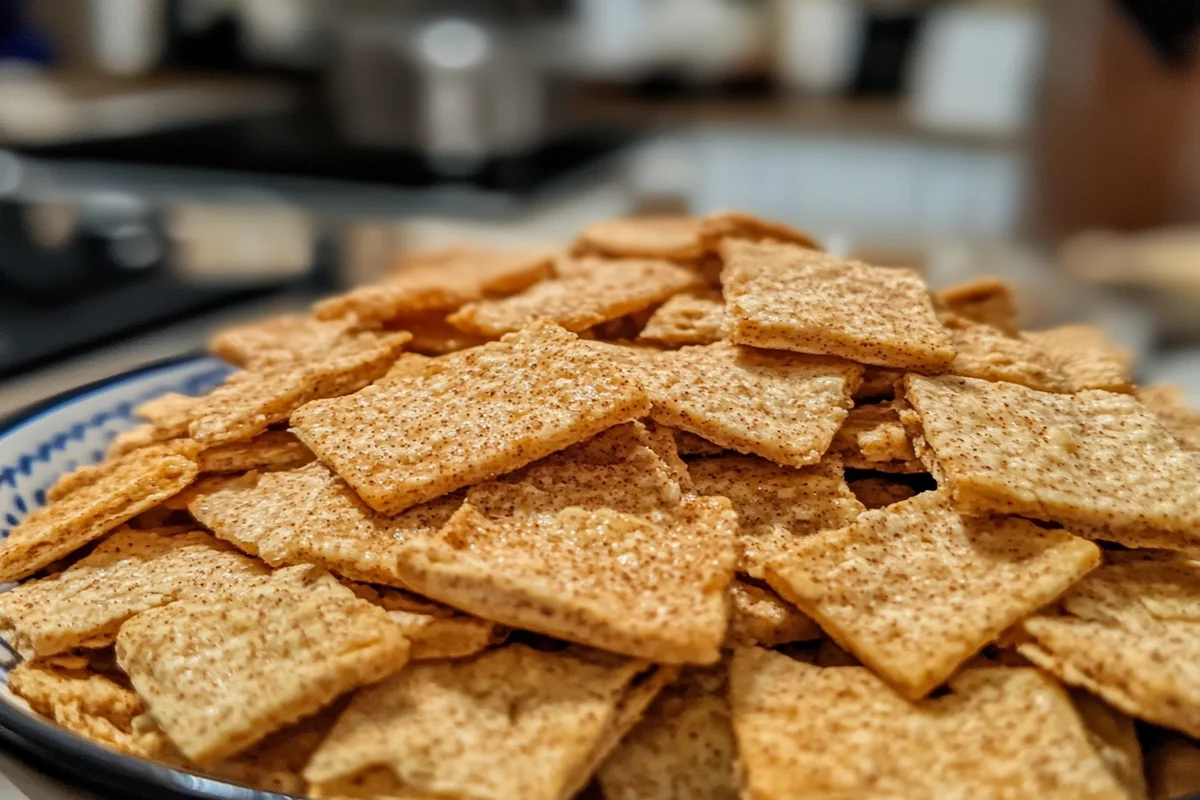
Introduction
Cinnamon Toast Crunch, a beloved breakfast cereal by many, often raises questions regarding its halal status. For Muslim consumers following Islamic dietary laws, knowing whether a product aligns with halal requirements is essential. In this article, we’ll delve into what makes food halal, scrutinize the ingredients of Cinnamon Toast Crunch, and explore perspectives from manufacturers, scholars, and consumers to uncover the truth. Let’s start this journey of informed decision-making with an understanding of halal certification.
Part 1: Understanding the Halal Status of Cinnamon Toast Crunch
What Does It Mean for Food to Be Halal?
Halal, an Arabic term meaning “permissible,” is a fundamental concept in Islamic dietary laws. Food is considered halal when it follows Islamic teachings, which prohibit certain ingredients and processes. For example, halal sources must provide animal-derived products, and all ingredients must remain free from contamination by haram (forbidden) substances.
For processed foods like Cinnamon Toast Crunch, determining halal status requires a closer examination. While cereal might seem harmless at first glance, hidden ingredients such as emulsifiers, additives, and flavorings can complicate things. Consequently, halal certification becomes a reliable standard to clarify doubts.
Why Halal Certification Matters
Halal certification is an assurance for Muslim consumers. It indicates that a product has undergone a rigorous process to verify its compliance with halal dietary guidelines. Certification bodies analyze everything—right from the origin of ingredients to the production process.
Without a halal certification, the status of foods like Cinnamon Toast Crunch becomes uncertain, leaving consumers to investigate on their own. This uncertainty often sparks debates and concerns within the community.
How Does Cinnamon Toast Crunch Fit Into the Halal Framework?
The appeal of Cinnamon Toast Crunch lies in its sweet, cinnamon-sugar-coated squares, perfect for breakfast or snacks. However, to assess its halal status, one must scrutinize its ingredients. Are they derived from permissible sources? Do they include animal-based additives or other potentially haram components? These questions must be answered for clarity.
In our next sections, we’ll delve deeper into the ingredients list, potential concerns, and opinions from scholars and manufacturers. We’ll uncover whether Cinnamon Toast Crunch aligns with halal dietary guidelines. Stay tuned!
Part 2: What Is Halal Certification?

Definition and Importance of Halal Certification
A globally recognized process confirms a product complies with Islamic dietary laws through halal certification. This certification ensures the product does not contain haram (forbidden) ingredients like pork derivatives or certain animal-based additives. But that’s not all—it also evaluates the manufacturing process, ensuring no cross-contamination occurs with non-halal substances.
For products like Cinnamon Toast Crunch, which include complex ingredients and additives, halal certification can be a definitive guide for Muslim consumers. Without it, consumers are left with uncertainty about whether the product fits their dietary needs.
Criteria for Halal Food Products
Halal certification requires food to meet stringent criteria. Firstly, any animal-derived ingredients must come from halal-slaughtered animals. Secondly, all additives and flavorings must be free from alcohol or non-halal animal sources. Lastly, the production process must avoid contamination with haram products.
For cereals, this includes checking emulsifiers, artificial colors, and preservatives. Soy lecithin, caramel color, and BHT, commonly found in Cinnamon Toast Crunch, often raise concerns about their sources and processing. Certified products eliminate these worries, offering peace of mind to consumers.
Why Is Certification Vital for Processed Foods?
Processed foods often include hidden ingredients that aren’t immediately apparent. Terms like “natural flavors” or “modified starch” can have ambiguous origins. Without halal certification, consumers must do extensive research or contact manufacturers directly, which isn’t always feasible.
For Muslim consumers, certification provides confidence. They know the product meets the required standards without the guesswork. Unfortunately, products like Cinnamon Toast Crunch do not come with a halal label, leaving their status open to interpretation and discussion.
In the next section, we’ll dive into Cinnamon Toast Crunch itself—its history, popularity, and most importantly, its ingredients. This exploration will bring us one step closer to answering the pressing question: Is Cinnamon Toast Crunch halal?
Part 3: Overview of Cinnamon Toast Crunch
History and Popularity of Cinnamon Toast Crunch
Since its introduction in 1984 by General Mills, Cinnamon Toast Crunch has become a household favorite for cereal enthusiasts. Its unique combination of sweet cinnamon flavor and crunchy texture has earned it a reputation as a delicious and versatile breakfast option. Over the years, it has been marketed as “the taste you can see,” emphasizing its sugar-and-cinnamon coating that appeals to children and adults alike.
The cereal’s widespread appeal isn’t just about its flavor. It’s also a convenient breakfast solution for busy mornings and a snack option for any time of day. However, for Muslim consumers, the growing curiosity about its ingredients has become an important part of its conversation.
Ingredients of Cinnamon Toast Crunch
Understanding the ingredients is essential to evaluate whether a food product like Cinnamon Toast Crunch is halal. Here’s the official list of its primary components:
- Whole grain wheat
- Sugar
- Rice flour
- Canola oil
- Fructose
- Maltodextrin
- Dextrose
- Salt
- Cinnamon
- Trisodium phosphate
- Soy lecithin
- Caramel color
- BHT for freshness
At first glance, these ingredients seem straightforward. But upon closer examination, some of these components—like caramel color, soy lecithin, and BHT—raise questions about their halal status due to their potential sources or manufacturing processes. These concerns lead us to an in-depth analysis of each ingredient, which we’ll tackle in the next section.
Why the Ingredients Matter for Halal Consumers
For Muslim consumers, the presence of animal-derived products or alcohol in even small amounts can render a product non-halal. Additionally, additives or preservatives with ambiguous origins often prompt questions about a food’s permissibility.
This complexity makes it crucial to scrutinize cereals like Cinnamon Toast Crunch. It’s not just about what’s in the box—it’s about how those ingredients are sourced and processed. In the upcoming part, we’ll break down each ingredient, highlight potential concerns, and evaluate them for halal compliance. Stay with us!
Part 4: Analyzing the Ingredients
Examination of Each Ingredient for Halal Compliance
When it comes to assessing the halal status of Cinnamon Toast Crunch, each ingredient plays a pivotal role. While some ingredients are inherently permissible, others require scrutiny to determine their sources and manufacturing processes. Let’s take a closer look at the cereal’s key components.
Whole Grain Wheat
Whole grain wheat, a primary ingredient in Cinnamon Toast Crunch, is naturally halal. As a plant-based product, it does not raise concerns for Muslim consumers.
Sugar
Sugar itself is halal, but there’s a caveat: the refining process. In some cases, sugar is processed using bone char, which can come from non-halal sources. While most manufacturers now use alternative refining methods, the lack of specific details from General Mills leaves this open to interpretation.
Rice Flour
Another plant-based ingredient, rice flour, is considered halal and is widely used in cereals to enhance texture and nutritional value.
Canola Oil
Canola oil, a vegetable oil, is permissible in Islam. It does not involve any non-halal processes or sources.
Fructose and Dextrose
Fructose and dextrose are both forms of sugar derived from plant-based sources.Both fructose and dextrose are forms of sugar derived from plant-based sources. These ingredients are typically halal unless contaminated during production, which is unlikely in large-scale food manufacturing.
Maltodextrin
Maltodextrin is a starch derivative commonly sourced from corn or wheat. It’s generally halal, but its halal status can depend on the enzymes used in its production. If derived from non-halal sources, it may pose an issue.
Salt and Cinnamon
Salt and cinnamon are basic, plant-derived ingredients and are entirely halal. These are among the least controversial components of Cinnamon Toast Crunch.
Trisodium Phosphate
This ingredient is a chemical compound used as a preservative. It does not have animal or alcohol origins, making it permissible for Muslim consumers.
Soy Lecithin
Soy lecithin, an emulsifier, is usually derived from soybeans, which are halal. However, the production process sometimes involves alcohol-based solvents. Without detailed information from the manufacturer, this ingredient remains a gray area.
Caramel Color
Caramel color can be a contentious ingredient. If it’s created using sugar and heat alone, it’s halal. However, certain production methods may involve non-halal additives, making it important to verify its origin.
BHT for Freshness
BHT (butylated hydroxytoluene) is a synthetic preservative. It is chemically derived and not sourced from animals, but the solvents and processes used during manufacturing determine its halal status.
Ingredients That May Raise Halal Concerns
While many ingredients in Cinnamon Toast Crunch are straightforward, others—such as sugar, soy lecithin, caramel color, and BHT—may warrant a closer look. The ambiguity surrounding their sources and processes often leaves Muslim consumers questioning whether the cereal aligns with halal dietary laws.
Why Ingredient Transparency Matters
For Muslim consumers, knowing the specifics about ingredient origins and production methods is critical. Unfortunately, unless a product like Cinnamon Toast Crunch carries a halal certification, verifying its compliance requires additional effort.
In the next section, we’ll explore potential concerns further and shed light on ingredients that commonly spark debate within the halal community. Stay tuned as we delve deeper into the nuances of food permissibility!
Part 5: Potential Concerns

Ingredients That May Raise Halal Concerns
While many ingredients in Cinnamon Toast Crunch are likely halal, some raise valid questions due to their sources or manufacturing processes. Let’s examine these components more closely to identify any potential issues.
Sugar and Its Refining Process
Sugar, as noted earlier, is inherently halal. However, the refining process can introduce complications. Some sugar refineries use bone char—a material derived from animal bones—to filter and bleach sugar. If manufacturers source bone char from non-halal animals, they may consider the sugar haram. Many manufacturers now use alternative refining methods, but they do not always disclose this information.
Soy Lecithin and Its Extraction
Soy lecithin, a common emulsifier, is usually derived from soybeans. However, alcohol-based solvents like ethanol are sometimes used during the extraction process. While the end product may not contain detectable levels of alcohol, the use of such solvents can lead to concerns about halal compliance.
Caramel Color and Its Production
Caramel color is created by heating sugar, which seems straightforward. However, certain production methods incorporate acids or other additives that could come from non-halal sources. For example, the use of dairy-based or animal-derived components during the coloring process could render it non-halal.
BHT and Its Solvents
BHT, or butylated hydroxytoluene, is a synthetic antioxidant used to preserve freshness. While chemically derived, some of the solvents used during its production might not be halal. If animal fats or alcohol are involved, this can compromise its permissibility.
Common Concerns Among Halal Consumers
Muslim consumers often grapple with hidden details in processed foods. Terms like “natural flavors” or “artificial color” on ingredient labels can mask the origin of ingredients, leaving consumers to wonder whether their food truly aligns with Islamic dietary guidelines. This uncertainty frequently leads to debates and hesitancy about products like Cinnamon Toast Crunch.
Navigating Uncertainties in Ingredients
The lack of transparency from manufacturers like General Mills makes it difficult to determine the halal status of Cinnamon Toast Crunch definitively. While the cereal does not contain overtly haram ingredients like pork or alcohol, the production methods and sources of certain additives remain ambiguous.
The Role of Consumer Advocacy
Advocating for clearer ingredient labeling and communication with manufacturers can help Muslim consumers make more informed decisions. By demanding greater transparency, consumers can bridge the gap between uncertain ingredients and halal compliance.
In the next section, we’ll explore General Mills’ stance on halal certification and its relevance to Cinnamon Toast Crunch. Understanding the manufacturer’s perspective is key to resolving this debate. Let’s uncover what they have to say!
Part 6: Manufacturer’s Stance
General Mills’ Position on Halal Certification
General Mills, the company behind Cinnamon Toast Crunch, has a global portfolio of popular brands. However, when it comes to halal certification, their stance varies depending on the market. While some of their products are certified halal in regions with significant Muslim populations, others—like Cinnamon Toast Crunch—do not carry a halal label in most countries.
The absence of halal certification does not automatically mean the product is haram. Instead, it suggests that the company has not undergone the necessary processes to verify the product’s compliance with Islamic dietary laws. For Muslim consumers, this lack of certification creates uncertainty, prompting questions about specific ingredients and their origins.
Statements on Ingredient Transparency
General Mills provides ingredient lists for its products, which is a good starting point for consumers evaluating halal compliance. However, detailed information about ingredient sources—such as whether the sugar is bone-char-free or whether soy lecithin is alcohol-free—is often missing. This lack of clarity can be frustrating for those seeking definitive answers.
When contacted, manufacturers may offer additional insights about their products. For example, they might confirm whether certain additives are plant-based or animal-derived. While this approach requires extra effort from consumers, it can provide valuable clarification.
Why General Mills May Not Pursue Certification
Halal certification is a resource-intensive process that involves stringent checks, documentation, and periodic audits. For companies like General Mills, certifying products like Cinnamon Toast Crunch might not seem essential in markets where demand for halal-certified items is relatively low. However, in regions where the Muslim population is substantial, they may prioritize certification for specific product lines.
What Consumers Can Do
Muslim consumers interested in Cinnamon Toast Crunch can take proactive steps to clarify its halal status. Here’s how:
- Contact the Manufacturer: Reach out to General Mills via email or customer service to inquire about specific ingredients and their sources.
- Check Local Variants: In some countries, different versions of the same product may be available. Look for halal-certified variants where applicable.
- Refer to Halal Authorities: Some halal certification bodies maintain lists of approved products, which can be a helpful resource.
The manufacturer’s perspective provides valuable context, but it’s equally important to consider the views of Islamic scholars and halal authorities. In the next section, we’ll explore these perspectives and how they influence the halal debate surrounding Cinnamon Toast Crunch. Stay tuned!
Part 7: Community Perspectives
Opinions from Islamic Scholars and Halal Authorities
Islamic scholars and halal authorities play a vital role in guiding Muslim consumers. Their interpretations of Islamic dietary laws help address ambiguities in food permissibility. When it comes to Cinnamon Toast Crunch, scholars tend to focus on two key aspects: ingredient origins and production processes.
Some scholars argue that the product can be considered permissible under the principle of tahara (purity) unless clear evidence of haram ingredients exists. Others, however, emphasize caution, particularly regarding additives like caramel color, soy lecithin, and BHT. Without halal certification or transparency from the manufacturer, they recommend erring on the side of safety and avoiding the product.
Halal authorities, such as the Halal Food Authority (HFA) or Islamic Food and Nutrition Council of America (IFANCA), often maintain detailed criteria for food evaluation. While Cinnamon Toast Crunch has not been certified by these bodies, consulting their guidelines can help consumers understand which ingredients might raise red flags.
Discussions in Muslim Communities
The debate over Cinnamon Toast Crunch’s halal status extends to online forums, social media groups, and local communities. Within these spaces, you’ll find a mix of opinions:
- Pro-Halal Perspective: Some consumers argue that the cereal is halal by default because it contains no explicitly haram ingredients like pork or alcohol. They point out that many of its components are plant-based or synthetic.
- Cautious Approach: Others advocate for caution, highlighting the potential for hidden non-halal elements in additives or during production. They argue that without certification, there’s no guarantee of compliance.
Community discussions often hinge on the availability of halal-certified alternatives. Some consumers opt for these alternatives to avoid any doubt, while others continue to enjoy Cinnamon Toast Crunch based on personal research and consultation with scholars.
A Divided Consensus
The lack of certification leaves room for personal interpretation. For some, the absence of haram ingredients is sufficient to deem the cereal permissible. For others, the uncertainty around additives and production processes makes it a product to avoid.
How Community Perspectives Influence Consumer Decisions
For many Muslim consumers, the opinions of their community and trusted scholars carry significant weight. These perspectives not only influence individual choices but also encourage broader conversations about the importance of transparency in food labeling and certification.
In the next section, we’ll compare Cinnamon Toast Crunch with other breakfast cereals and explore halal-certified alternatives. This comparative analysis will provide a clearer picture of where this popular cereal stands in the larger market. Let’s dive in!
Part 8: Comparative Analysis
Comparison with Other Breakfast Cereals
When assessing the halal status of Cinnamon Toast Crunch, it’s helpful to compare it with other breakfast cereals. Many cereals share similar ingredients, but their permissibility can vary based on the sources and production processes of these components. Let’s take a closer look at how Cinnamon Toast Crunch stacks up against other popular options.
Cereals with Similar Ingredients
Brands like Frosted Flakes or Honey Nut Cheerios also contain common ingredients such as sugar, flavorings, and preservatives. While these cereals don’t always carry halal certification, their ingredients often prompt similar debates. Additives like caramel color, artificial flavors, and preservatives are key areas of concern across the board.
Cereals with Halal Certification
Several breakfast cereals are explicitly halal-certified, offering Muslim consumers peace of mind. Brands available in regions with significant Muslim populations, such as Malaysia or the UAE, often cater to this demand. For example, Nestlé provides halal-certified versions of its cereals in select markets, ensuring compliance with Islamic dietary laws.
Key Differences
The primary difference between Cinnamon Toast Crunch and halal-certified cereals lies in transparency. Certified options undergo rigorous checks to ensure every ingredient and production process adheres to halal guidelines. In contrast, products like Cinnamon Toast Crunch rely on consumer trust and assumptions, which can lead to uncertainty.
Availability of Halal-Certified Alternatives
For Muslim consumers seeking alternatives to Cinnamon Toast Crunch, the market offers a variety of halal-certified cereals. These include:
- Nestlé Corn Flakes: A classic option with simple ingredients and halal certification in many regions.
- Kellogg’s Special K: Certain varieties of Special K are halal-certified and widely available.
- Weetabix: Often certified halal, Weetabix provides a wholesome, straightforward cereal choice.
These products not only eliminate doubts about permissibility but also align with the dietary needs of a diverse consumer base.
Making Informed Choices
Comparing Cinnamon Toast Crunch with other cereals highlights the importance of certification and ingredient transparency. While it remains a popular option, the lack of a halal label makes it less appealing to cautious consumers. Halal-certified alternatives provide a clear solution for those seeking a guaranteed halal breakfast option.
In the next section, we’ll shift focus to actionable steps for consumers. From checking ingredient labels to reaching out to manufacturers, we’ll discuss how to navigate the complexities of determining halal compliance. Stay with us!
Part 9: Steps for Consumers
How to Determine the Halal Status of Food Products
Deciphering whether a product like Cinnamon Toast Crunch is halal can feel like an uphill battle. However, by following a systematic approach, consumers can make more informed decisions. Here’s how to get started:
1. Check the Ingredient List
Start by reviewing the product’s ingredient list. Look for keywords that might indicate non-halal elements, such as “natural flavors,” “caramel color,” or “lecithin.” For any unfamiliar terms, conduct research to understand their origins and manufacturing processes.
2. Look for Halal Certification
Halal-certified products are the gold standard for ensuring compliance with Islamic dietary laws. Always check for a recognizable certification logo on the packaging. If Cinnamon Toast Crunch had a halal certification, it would remove any doubt for consumers.
3. Consult Trusted Halal Databases
Websites and apps maintained by halal certification bodies, like IFANCA or Halal Food Authority, often list approved products. Searching these databases can save time and offer clear answers.
Contacting Manufacturers for Clarification
When the ingredient list or halal certification status is unclear, reaching out to the manufacturer directly is a practical step. Here’s how to do it:
1. Prepare Your Questions
Before contacting the company, compile a list of questions. For example:
- Are all ingredients plant-based or synthetic?
- Does the production process involve cross-contamination with non-halal substances?
- Is soy lecithin derived without alcohol?
2. Use the Right Channels
Most manufacturers, including General Mills, have dedicated customer service teams available via email, phone, or online contact forms. Don’t hesitate to ask for clarification about specific ingredients or processes.
3. Document Their Response
Keep a record of the information provided by the manufacturer. This can serve as a reference for future purchases or discussions with others in your community.
Why Consumer Action Matters
By proactively engaging with manufacturers and conducting independent research, consumers can bridge the gap between uncertainty and informed decision-making. Moreover, collective efforts by the Muslim community to demand halal transparency can encourage companies to prioritize certification for their products.
Empowering Yourself Through Knowledge
Taking these steps not only helps in determining the halal status of products like Cinnamon Toast Crunch but also empowers consumers to make better choices across all food categories. In the next section, we’ll summarize our findings and provide actionable takeaways for the ultimate question: Is Cinnamon Toast Crunch halal? Stay tuned!
Part 10: Conclusion
Summary of Findings on Cinnamon Toast Crunch’s Halal Status
The question, Is Cinnamon Toast Crunch halal?, does not have a definitive yes or no answer due to the cereal’s lack of halal certification. While the ingredients list does not explicitly indicate the presence of haram (forbidden) substances, certain components, such as sugar, caramel color, soy lecithin, and BHT, raise questions about their sources and production methods.
Halal certification is the clearest way to establish compliance with Islamic dietary laws. Unfortunately, Cinnamon Toast Crunch does not carry this certification in most markets, leaving Muslim consumers to rely on ingredient transparency and personal discretion.
Key Takeaways for Muslim Consumers
- Ingredient Scrutiny Is Essential: Understanding the sources and processes behind additives like soy lecithin and caramel color is key to making informed decisions.
- Certification Makes a Difference: Halal-certified alternatives provide peace of mind and eliminate the guesswork. Brands like Nestlé and Kellogg’s offer halal-certified options in many regions.
- Advocacy Can Drive Change: Consumers reaching out to manufacturers for halal certification may encourage companies like General Mills to prioritize transparency and certification in the future.
Final Thoughts
For now, the permissibility of Cinnamon Toast Crunch ultimately depends on individual interpretation and comfort level. While some may choose to consume it based on its ingredients, others might prefer to avoid it due to the absence of certification. Regardless, understanding the importance of halal compliance and advocating for greater transparency in the food industry benefits not just Muslim consumers but everyone seeking ethical and clear labeling.
Part 11: FAQs
Is Cinnamon Toast Crunch suitable for vegetarians?
Yes, Cinnamon Toast Crunch is considered vegetarian-friendly as it does not contain any directly animal-derived ingredients like gelatin or meat byproducts. However, certain additives like sugar or caramel color might involve animal-based processes, which may concern some strict vegetarians.
Does Cinnamon Toast Crunch contain any pork-derived ingredients?
No, Cinnamon Toast Crunch does not list any pork-derived ingredients in its composition. However, the absence of halal certification means its compliance with strict Islamic dietary laws cannot be confirmed without further clarification from the manufacturer.
Are there any animal-derived ingredients in Cinnamon Toast Crunch?
Based on the ingredient list, Cinnamon Toast Crunch does not seem to include animal-derived ingredients. However, additives like sugar and caramel color might be processed with animal-based materials during manufacturing, which raises concerns for halal compliance.
Is there alcohol in the flavorings of Cinnamon Toast Crunch?
The manufacturer has not disclosed whether they use alcohol in producing Cinnamon Toast Crunch’s flavorings. While they often process many flavorings with alcohol, the finished product typically contains negligible or undetectable traces. It’s best to verify directly with General Mills for clarity.
How can I find halal-certified cereals?
Look for halal certification symbols on cereal packaging or refer to trusted halal certification authorities like IFANCA or Halal Food Authority. Many global brands, including Nestlé and Kellogg’s, offer halal-certified cereals in specific regions.
Does General Mills provide halal certification for any of its products?
General Mills does offer halal-certified products in certain markets, but Cinnamon Toast Crunch is not listed as halal-certified in most regions. You can contact their customer service for updates on certification and ingredients.
By addressing these common questions, we’ve provided additional clarity about Cinnamon Toast Crunch and its halal status. Consumers are encouraged to remain proactive and informed when choosing products that align with their dietary requirements.

